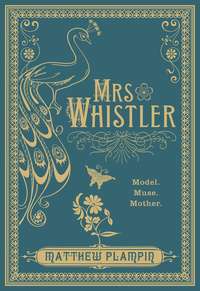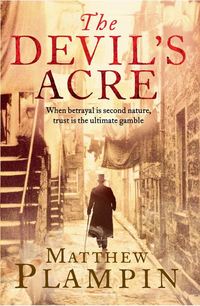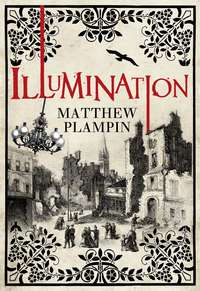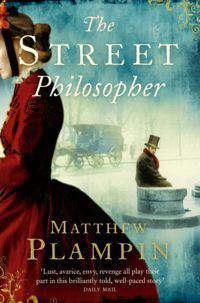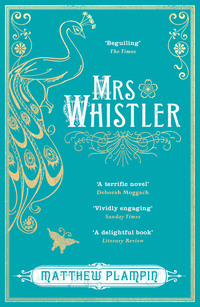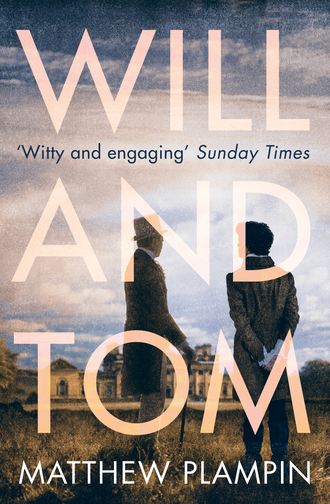
Полная версия
Will & Tom
Will edges by unremarked. His goal is the kitchen, and the supper he hopes will be available within. He succeeds in reaching the doorway. Servants stream constantly in and out. Past them, he glimpses billowing steam clouds, a surface covered with gold-leafed plates, a spout of orange flame. There is a searing hiss, like fat sliding across a hot pan; someone, the chef presumably, curses loudly in French. Will moves on, further into the house. If he enters that kitchen now and asks to be fed he’ll be lucky not to have a spoon thrown at him. Better to sit in the servants’ hall until the weight of their duties has eased.
Suddenly the servants come to a stop, stepping against the walls, bowing their heads and dropping cramped curtseys. Beau walks through, unmindful of all, on his way to rejoin the festivities on the state floor; Tom Girtin is beside him, finishing a story. Will slips down a corridor, out of sight. He recognises this tale immediately. It’s one of Tom’s favourites.
When they were but fourteen years of age, the two of them had been due to join a sketching party to Hampton Court, under the stewardship of Tom’s erstwhile master, Edward Dayes. A boat was hired, and the company of young artists and apprentices gathered on the wharf at Blackfriars. Will voiced a desire to sit at the prow; Dayes had this privilege marked for himself. The resulting clash, between a renowned watercolour artist and a barber’s son from Maiden Lane, was terrible to behold, and resulted in Will remaining ashore, stalking back to Covent Garden as the boat and its mirthful cargo eased out onto the river.
‘The pattern of Will’s life was set that morning,’ Tom concludes. ‘Everything since has been mere reiteration.’
Beau laughs. ‘It is fair to say, then, that Mr Turner tends towards obstinacy?’
‘He’s a brother to me, honestly; but the most ill-tempered old donkey, denied his feed-bag and left out in the rain, is a picture of good humour by comparison.’
They mount the stairs and are gone. The servants return to work as if freed from a spell. Will takes a breath; he rubs the frown lines from his brow. His capacity for astonishment or umbrage at this situation is exhausted. Tom’s words, in truth, do not anger him particularly. Donkey, mule, ox – such epithets lost their sting long ago, and are now heard with something close to pride. Let them, he thinks. Let the Lascelles make Tom Girtin their pet. It’s hardly a secret that the fellow has no diligence, no discipline and a host of other defects. Let them wait month upon month for his drawings, long after Will’s are adorning their walls, winning widespread admiration. Let them—
‘A hand, Mr Turner, if you please?’
Mrs Lamb is at Will’s shoulder, standing close and smiling wide. She has a small sack clasped to her chest and another resting between her boots.
‘London brawn, sir, is what I need. Seems I’ve overreached myself – this here load is more than I can manage.’ She leans in yet closer, her mouth inches from Will’s ear, and lowers her voice conspiratorially. ‘I can promise you a fine reward.’
Will reaches for the sack on the ground. It holds only three slim silver trays – Mrs Lamb could surely have carried it without difficulty. This request for assistance is a ruse, but Will is content to play along. He has a question of his own for the still-room maid.
‘Lead on,’ he says.
She doesn’t move. ‘You’re friendly with him, in’t you – with this other artist, Mr Girtin. I saw you from my window, just now. Out on the lawn.’
‘We’ve known each other a good while.’
Mrs Lamb catches the distinction; her mouth narrows very slightly. ‘The gentleman’s arrival this afternoon was the talk of the house. He was at Harewood last summer as well, you understand. Among the very first guests the new family admitted. Couple of the housemaids grew quite besotted with him. Our dashing young painter.’
Will has no response to this. He adjusts his hold on the leather-bound sketchbooks.
Mrs Lamb is studying him with her black, unblinking eyes. ‘You weren’t told that your friend was coming here, were you, sir?’
‘Neither was he,’ says Will quickly. ‘Neither was Tom.’
The still-room maid brushes past, the stained cuff of her dress pressing against Will’s sleeve, then tearing away with a syrupy tackiness. ‘Goodness, Mr Turner, neither was anyone! You saw the confusion yesterday, when you showed up at our door. The family expect us to manage their little surprises, whatever they might be. Just look at the unholy bother down here this evening – twelve extra guests there are, and with no notice at all. A wonder we don’t rise up against ’em.’
Swinging about, Mrs Lamb advances imperturbably into the crowded junction of corridors before the kitchens. Will follows, trying to keep in her wake and out of everyone’s way. This is impossible: when a footman strides from the western stairwell, he has to skip sideways to avoid a collision. The servant is bearing a silver wine cooler, an ornate piece with lion’s feet at its base, filled almost to the brim with fresh vomit. Mr Purkiss is named as the culprit; wearily, as if this is but the latest in a line of similar misdemeanours.
‘Life in service, eh, lad?’ says Mrs Lamb to the footman. ‘Does it match your boyhood dreams?’
‘Enough now,’ calls Mr Noakes from his stool, over the laughter. ‘Sluice room with that, Mr Jenkins.’
The passage to the still room is quieter, a rich, jammy smell thickening the air. They go inside; moulds and pans, recently used, are piled upon the dormant stove, and perhaps two dozen tallow candles burn in a range of improvised holders. A stout table has been brought in and stood in the centre of the room. Across its middle, in their hundreds, are jellied sweetmeats. This is their source. Dusted lightly with sugar, they are arranged in rainbow bands – ruby red sea shells, like the one Will sampled; stars of jade with trailing tails; azure fishes beside coral-pink piglets.
‘My contribution,’ says Mrs Lamb, ‘to this most magical of nights. A new batch, Mr Turner, made especially. Pass over the trays, would you?’
They are alone, the door standing ajar behind them. Will sets down the sack. ‘Them candles you gave me,’ he says.
‘Oh aye. How d’ye find them? Any better?’
Will unclasps the larger sketchbook and takes the Brookes print from under the front cover. The moment is not nearly as dramatic as he envisaged. Mrs Lamb looks at the page for a second only. It leaves her totally unconcerned. She starts to stack dirty bowls and utensils at the table’s edge, clearing a space by the sweetmeats.
‘Mr Turner,’ she says, ‘you must pay no mind to that. It’s speakers in the markets, sir, over at Leeds and elsewhere. The scoundrels will stuff their pamphlets into a basket without so much as a by-your-leave. I use them for scrap.’ She heaves a chopping board to the floor. ‘I’m sorry, truly, if that one upset you.’
‘It didn’t upset me, madam,’ Will lies hotly. ‘It simply … it …’ He stops, wrong-footed. ‘It was chance, then? An accident?’
The still-room maid tosses a long knife into a dish, the bone handle clattering around the rim. ‘Heavens, Mr Turner, so mistrustful! Tell me, what else could it be? Why might I have done such a thing on purpose?’
Will’s gaze strays to the bowed hull of the Brookes. ‘That I don’t know.’
‘There’s the blessed family for a start, and the minions they have hereabouts. If Noakes or Cope found a body with summat like that they’d see them whipped like they was caught poaching rabbits. Why didn’t you rid yourself of it?’
Staring now, Will is thinking of the slave ship upon the open sea, and how it would move; the dreadful compression of humanity below deck as it rolled upon a wave; the hundreds of gallons of freezing saltwater that would pour in through the hatches. ‘I don’t know that either.’
Mrs Lamb comes around the table to retrieve her sack. She slides out the silver trays and lays them in a row, upon the knotted wood. ‘There’s more,’ she says, almost casually, ‘if you want them, that is. In that drawer.’
Will is snapped back to the still room. ‘What d’you mean?’
She shrugs. ‘Just seems that you’re holding on to that one very tightly, Mr Turner. Perhaps it speaks to you. To your Christian conscience.’
Will returns the Brookes to his sketchbook, refastens the clasps and looks towards the door. Is this why she wanted him in there? Why she snagged him in the corridor? He has an instinctive wariness of causes. Painters of any ambition take care to remain independent. He knows a couple of politically minded artists back in London and it’s proving a pronounced obstacle to their rise. ‘I don’t, madam. I assure you.’
The still-room maid shrugs again and begins to transfer the sweetmeats from table to tray, plucking up three or four of the miniature piglets at a time; and then she changes the subject so deftly and completely that it’s as if their discussion of the Brookes hadn’t occurred.
‘In’t it strange, though,’ she says, ‘that the family should be choosing to put on such a large entertainment as this one upstairs. Word down here is that Mr Lascelles and his sisters – one of his sisters, anyhow – should rightfully be hiding themselves away.’
Will, still a little flustered and contemplating his exit, wasn’t listening. ‘Beg pardon?’
‘And there’s the death.’ Mrs Lamb adjusts a couple of the piglets. ‘Some might say that it’s difficult to mourn an infant only a day old, already buried down in Huntingdonshire, and with a twin still living. But their brother Henry would be unimpressed, I reckon, and injured perhaps, to see all this jollity at Harewood barely two months later.’
This Will hears. Henry Lascelles is the second son, the politician. Will was unaware that he’d suffered such a loss. Small children die easily, though, and babies especially; it is not, in his experience, regarded as grounds for any prolonged seclusion. ‘What was the first thing? The sisters?’
Mrs Lamb, starting on the fishes, is happy to tell him. ‘They say that our Miss Lascelles found herself in a spot of trouble down in London. Quite compromised, she was. The poor dear had to be whisked off post-haste, back to Harewood.’
Just as Will deduced. He sees Mary Ann flouncing from the dining room upstairs, her footfalls rattling the glassware; Beau’s show of contrition once she was gone. ‘What happened?’
‘D’ye really not know, Mr Turner? D’ye not read the London papers? The Intelligencer and suchlike?’
Gutter rags were always heaped around Father’s shop, pored over by the clientele, every veiled reference and pseudonym debated at length. Will, concerned only with art reviews, never looks at them. ‘I confess that I don’t.’
The first silver tray is covered, loaded with confectionary. Mrs Lamb switches to the stars, continuing her revelations with steely levity. ‘You’ll be unaware, then, that Miss Lascelles’ mishaps are followed closely in their pages. All the available details. They find their way up here eventually. And those on the staff who wintered at Hanover Square saw plenty of it for themselves.’ She taps a clot of sugar from a star’s tail. ‘There was an affair, Mr Turner, and a wild one at that, and then there was a jilting. Our young miss was knocked off some gentleman’s boots like a lump of dung.’
‘Who was he?’
‘No one can discover. A mysterious nobleman so very rich that the prospect of the Lascelles’ millions leaves him unmoved, and with enough sway on Grub Street to keep his name the subject of guesswork only.’ Mrs Lamb straightens up for a few seconds, wiping a palm on her apron. ‘It’s a grand humiliation for her, to be sure. For the lot of them. Yet here they are inviting dozens to dine and drink in their home, and artists, two artists no less, to sketch in its grounds.’ She begins to fill the final tray. ‘It don’t fit.’
‘Perhaps they think it best to act as if unaffected.’
Again, her expression is doubtful; and then, noticing something behind him, it grows distinctly frosty. Will turns to find Mr Cope standing in the doorway. An uncomfortable pressure creeps up behind Will’s ears. It is impossible to say how much the valet might have heard. He curses himself for indulging in such careless gossip.
‘Mr Turner is a painter, Mrs Lamb,’ says Mr Cope, calm and unforgiving. ‘He is the guest of your master. He is not at Harewood for you to collar whenever you need an errand boy.’
The still-room maid’s smile is terrifying, a parody of graciousness. ‘Why, and a very good evening to you too, Mr Cope! The young gentleman has only been helping me for a minute. Besides which, might I point out that it is dark? What painting could he be doing now?’
Will’s eyes go back to the valet.
‘Mr Turner is here at the invitation of Lord Harewood’s son.’ Mr Cope speaks more slowly, as if for an idiot. ‘He has specific tasks assigned to him and little time in which to perform them. You are not to distract him with duties that belong properly to domestic servants. Do you follow?’
The false smile drops away. Mrs Lamb shifts back from the table and plants a fist against her hip. ‘It were common courtesy, that’s all. I had a heavy burden and Mr Turner was good enough to offer me assistance. Few of your precious domestic servants would do the same.’
Mr Cope will not argue. He extends a long arm into the corridor. ‘Mr Turner.’
The valet’s manner, taking compliance utterly for granted, reminds Will of the music room, and the slighting way in which his terms were conveyed. He isn’t about to refuse, though, or chance a bold remark – not with the Brookes inside his larger sketchbook. In fact, he finds it easy to imagine that Mr Cope might be drawn to the print somehow; that he might sniff it out and run barking to his master. The best course is to go with him, peel away as soon as he can, pleading tiredness, and then burn the thing back in the casket chamber. He bids Mrs Lamb good evening, but gets no response. She is bent over her table, making a great fuss of laying out the red sea shells on their tray, and ignoring everything else.
‘Be careful, Mrs Lamb,’ says the valet, once Will is through the door. ‘Their tolerance is nearly at an end.’
The service floor has emptied. Many of the servants are upstairs, Will supposes, setting the banqueting table in the gallery. Valet and painter walk side by side. After a dozen yards or so Mr Cope says that he understands Will is not joining the company in the saloon; would he care for some supper in the servants’ hall instead? Will’s belly emits a joyful growl. He replies that he would, and despite his apprehension he is thankful, once again, for the valet’s effectiveness.
They separate, Mr Cope heading for the kitchens. Only when seated on a bench in the servants’ hall, the sketchbooks safely beside him, does Will properly consider what has happened. It is easy enough to work out how the fellow knew where he was – Mr Noakes must have told him when he went upstairs to marshal the dinner party. Why, though, had Mr Cope come at all? Why had he been so set on removing Will from the still room? What kind of a damn valet is this?
Mr Cope appears with a plate of food and a tin tankard. The few servants loitering in the hall disperse immediately. Will’s meal is set upon the table, roast pork and potatoes and a pint of treacle-coloured ale, along with a plain knife and fork. He bolts it, more or less. This has become a ritual of his tour: the sating of his hunger after a productive day outdoors, shutting out the world to go face down in the trough. The food itself is almost unimportant – fortunately, given some of the tavern fare he has endured – but this is good, really good, the meat tender and the ale smooth. He’s halfway through before he realises that Mr Cope is still there, at his shoulder, peering at him coolly like a stone saint up on a cathedral. Seeing that he has Will’s attention, the valet begins to speak; his voice is different, quieter, with the trace of a London accent.
‘Mrs Lamb isn’t your friend.’
Will lays down his fork. ‘Never thought she was, Mr Cope.’
‘It’s a game she plays. You must see this. She’s trying to get you on her side.’
Will thinks of the Brookes print, hidden not six inches from his thigh; Mrs Lamb’s rather flimsy explanation of how it came to be in his possession; her offer of more. ‘Beg pardon?’
The ghost of a smile crosses Mr Cope’s face. ‘Some advice, Mr Turner. Resist it.’
And with that he’s gone, departing the servants’ hall for the nearest staircase. Will looks blankly at the strands of pork still upon his plate. Ale gurgles inside him; he smothers a belch against his sleeve. Then he rocks forward on the bench, shovels in the remainder of the meal and scrambles to his feet. He’s at the casket chamber in less than two minutes, hunched over a tallow candle, feeding the Brookes print into the flame. The paper is dry and membrane-thin; it flares yellow, curling to a blackened wisp that floats up from his fingers, vanishing into the shadows overhead. Will slumps back on the bed. He is filled, more than anything, with a sense of monumental unfairness. Making drawings of an aristocratic estate is a simple enough proposition. It has been going on for centuries, and mostly without incident. Yet when he attempts it, bringing with him all of his assiduousness and ability, he is plunged into a dark farce – a mess of unwelcome complications. It truly defies belief.
Will rests a hand on his sketchbooks; a steadying breath becomes a yawn. He has to sleep. He has to keep to his schedule.
He has to get away from this place.
Thursday
It is well past noon when Tom appears. Will is sat against a fin of mossy rock; he lifts his porte-crayone from the paper and watches the other painter approach. Tom wears a faded travelling coat the colour of builder’s clay, long riding trousers rather than breeches and a pair of scuffed boots. He is bare-headed and carries nothing: no umbrella, sketchbook or drawing board. That easy stride of his, that expression somehow light-hearted yet unyielding, causes Will to remember the last time he’d seen him in London, several weeks before the opening of the Academy Exhibition. There had been a pack of them, installed in a tavern after a day painting scenery at the Sans Souci. Full of punch and lively defiance, Tom had climbed atop a chair, set on defying the gagging acts by reciting a passage from one of his radicals. ‘My own mind is my church!’ he’d cried, swatting at Georgie Samuel as he tried to pull him back down. An unthinking grin curls the corner of Will’s mouth.
Tom flops beside the rock. He gives Will’s thigh a good-natured pat before stretching himself out, crossing his legs at the ankle and covering his eyes with his arm. Will says nothing. He’s back in his sketch, the first of the long views, tracing a knotted thicket and the small farm building half hidden within. After a few minutes he realises that Tom has fallen asleep.
An hour or so goes by. Will completes his view and places it in the larger sketchbook. He sits for a while, chewing on a piece of bread given to him by the kitchen maids. It has been a dull day thus far, overcast, the sky flat and featureless. Now, though, a single coin of sunlight falls onto the sloping lawn that runs from Harewood’s southern front to the boating pond in the middle of the valley. It expands, grows stronger, tinting the grass with shimmering yellow; and the clouds begin to ease apart, revealing pure blue above.
Tom stirs, sitting up, fumbling with his tail-pocket. Instead of a roll of paper, however, or a porte-crayone of his own, he takes out a pipe and tinderbox.
‘You didn’t wait,’ he says.
‘Couldn’t.’ Will swallows some bread. ‘Work to do.’
‘Suppose you did retire early. Why, it was barely dark.’
‘And I’ll wager you was up till it was close to light again.’
This is no wager. Will was woken in the early dawn by singing and ragged, drunken laughter, issuing from the flower garden, among which Tom’s voice was plainly heard. He’d clamped his pillow over his head and made an unsuccessful attempt to swear himself back to sleep.
‘Man must live, Will. Seize what he can.’
‘That’s living, is it, Tom? Prancing about with the Lascelles and their crowd?’
Tom grins. ‘It does have its shortcomings,’ he admits. ‘These noble gentlemen are testing at times. Remove the carriages and the costly clothes and there’s nearly always a dolt beneath.’
‘Does your chum Beau number among the dolts, I wonder?’
Untroubled by Will’s irritability, Tom opens the tinderbox and prepares the charcloth. ‘You know full well what that was, Will, as you must do it yourself.’ He fits his fingers in the D-shaped firesteel and strikes it against the flint. The sound is piercing, fractured; Will winces to hear it. ‘God knows, they’re easy enough to please. All a fellow really has to do is laugh at their damn jokes. It was Nelson last night. “Albion’s foes will discover that although now armless, he remains far from harmless.” From their mirth you’d think it was the sharpest line ever uttered.’ Tom strikes the flint again. ‘You heard of this, off on your tour?’
The news had arrived on Will’s last day in York: a furious battle against the Spanish at Tenerife, a decisive defeat, England’s great hero so gravely wounded. Patrons had wept openly in the snug bar of the Black Horse. Will’s thoughts, as always, were of painting. It would surely make for a fine narrative subject, a scene both affecting and rousing – the enormous frigates; the perfect disc of the moon; the injured Admiral refusing all aid as he marched himself to the surgeon. But he doesn’t want to discuss this now.
‘What terms did he give you?’
At the third strike a minute spark flits from the flint and smoulders on a fold in the charcloth. Tom is ready with a taper, which he then pokes into the pipe’s bowl, sucking on the stem as he does so. ‘For my chest,’ he murmurs, sucking again. ‘Monro’s recommendation. Damn nuisance, to tell the truth.’
Will repeats his question.
The tobacco catches, and for a minute Tom’s coughing prevents all speech. Will finishes off the bread; he watches the sun spread through the valley, casting a sheet of blazing white across the pond.
‘None as such,’ Tom says at last, dabbing at his eyes with his coat cuff. ‘Beau’s idea simply seems to be that I live in the household. Spend my days out here in the park.’ Sitting next to Will, his back against the rock, Tom tries the pipe again. This time is easier; he puffs twice, then exhales a coil of smoke. ‘But I have to say, Will, it’s a damn strange place to be. All of it is fake, from these woods here to the very hills they are rooted upon. It ain’t nature as I know her, that’s for sure.’ He leans forward, gesturing with his pipe. ‘And the house. Look at it. There’s a hundred exactly like it elsewhere in England, damn near identical in all but size. There’s no art in its construction. No history in its stones. It speaks of nothing but money.’
‘You’re happy enough to stay here,’ Will observes, not mentioning his own similar thoughts. ‘And not for the first time neither.’
Tom smokes in contemplation. ‘Naturally I’m happy,’ he says. ‘London is hellish at present. The war goes badly still. Soldiers are everywhere. Friends of liberty, of any species of liberty, must be constantly on their guard. They’ll throw you in Newgate merely for speaking out of turn – and they’ll keep you in there, without charge, for as long as they damn well please. That villain Pitt wants us cowed, Will, and it’s working. Why, it feels sometimes as if every decent person has fled the city.’
This picture is exaggerated. Tom has always been the sort who relishes a drama, preferably with himself playing a central part. Will pushes his sun hat to the back of his head. He waits for the other painter to continue.
‘Up here, though, all that noise goes quiet. A man can rest. Order his thoughts.’ Tom becomes confiding. ‘And there’s other advantages. This I learned well last year. Beneath the baron’s roof, and toiling in the baron’s farms, are many young women – and every last one of them, Will, is bored senseless.’ He draws on his pipe. ‘I mean, think of their lives. Their labours. How bleak and unending it must be. It don’t take much, at any rate, to win their favour. Most of them will clutch at a chance for diversion with all they’ve got.’


